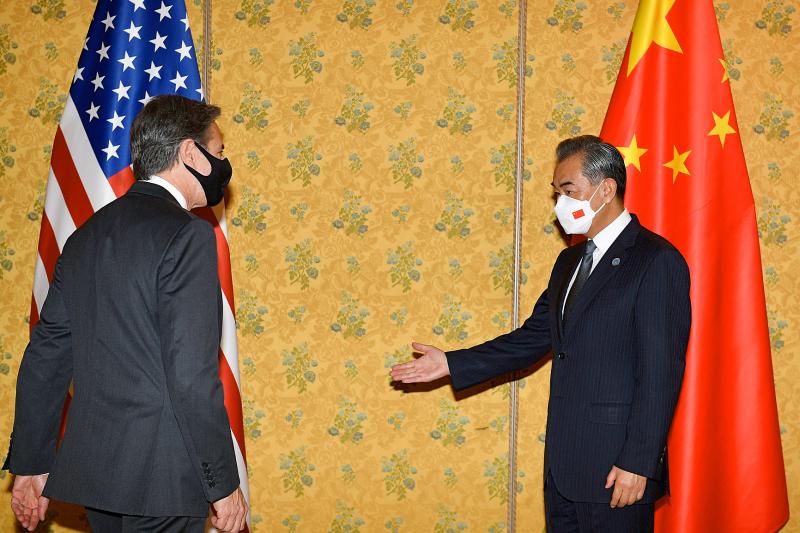US Secretary of State Antony Blinken yesterday told his Chinese counterpart that the US opposes actions by China that have increased tensions across the Taiwan Strait, a senior US Department of State official said.
During the hour-long meeting with Chinese Minister of Foreign Affairs Wang Yi (王毅) on the sidelines of a G20 summit in Rome, Blinken made “crystal clear” that Washington opposes any unilateral changes by Beijing to the “status quo” there, the official said.
An increase in Chinese military exercises in Taiwan’s air defence identification zone in the past few months are part of what Taiwan views as stepped-up military harassment by Beijing.

Photo: AP
The US wants to manage the intense competition between the world’s two largest economies responsibly, the state department official said, adding that both sides acknowledged that open lines of communication are paramount.
While the US, like most countries, has no formal ties with Taiwan, Washington is the nation’s most important international backer and main arms supplier, and is required by law to provide it with the means to defend itself.
Washington has long followed a policy of “strategic ambiguity” on whether it would intervene militarily to protect Taiwan in the event of a Chinese attack, although US President Joe Biden last week said that the US would come to Taiwan’s defense if necessary.
Blinken made clear that Washington had not changed its “one China” policy regarding Taiwan, the official said.
He and Wang did not discuss a recent Chinese hypersonic weapons test that military experts say appears to show Beijing’s pursuit of an Earth-orbiting system designed to evade US missile defenses, the official said.
Separately, Chinese President Xi Jinping (習近平) on Saturday called for mutual recognition of COVID-19 vaccines based on the WHO’s emergency use list, according to a transcript of his remarks published by China’s Xinhua news agency.
Speaking to the G20 Leaders’ Summit via video link, Xi said that China had provided more than 1.6 billion COVID-19 shots to the world, and was working with 16 nations to cooperate on manufacturing doses.
“China is willing to work with all parties to improve the accessibility and affordability of COVID-19 vaccines in developing countries,” Xi said.
Xi reiterated China’s support of the WTO making an early decision on waiving intellectual property rights for COVID-19 vaccines, and he called for vaccine companies to be encouraged to transfer technology to developing countries.
Two Chinese vaccines have been included in the WHO’s emergency use list.
Xi also called for policies to maintain global economic and financial stability, saying that China would strengthen macroeconomic policy coordination and maintain policy continuity, stability and sustainability.
“Major economies should adopt responsible macroeconomic policies to avoid negative spillover effects to developing countries and maintain the steady operation of the international economic and financial system,” he said.
Xi’s statement came as G20 leaders endorsed a global minimum tax on corporations, a linchpin of new international tax rules aimed at blunting the edge of tax havens amid skyrocketing profits of some multinational businesses.
The move was hailed by US Secretary of the Treasury Janet Yellen as benefiting US businesses and workers.
G20 finance ministers in July agreed on a 15 percent minimum tax, which the leaders’ summit formally endorsed.
Additional reporting by AP

CHAOS: Iranians took to the streets playing celebratory music after reports of Khamenei’s death on Saturday, while mourners also gathered in Tehran yesterday Iranian Supreme Leader Ayatollah Ali Khamenei was killed in a major attack on Iran launched by Israel and the US, throwing the future of the Islamic republic into doubt and raising the risk of regional instability. Iranian state television and the state-run IRNA news agency announced the 86-year-old’s death early yesterday. US President Donald Trump said it gave Iranians their “greatest chance” to “take back” their country. The announcements came after a joint US and Israeli aerial bombardment that targeted Iranian military and governmental sites. Trump said the “heavy and pinpoint bombing” would continue through the week or as long

TRUST: The KMT said it respected the US’ timing and considerations, and hoped it would continue to honor its commitments to helping Taiwan bolster its defenses and deterrence US President Donald Trump is delaying a multibillion-dollar arms sale to Taiwan to ensure his visit to Beijing is successful, a New York Times report said. The weapons sales package has stalled in the US Department of State, the report said, citing US officials it did not identify. The White House has told agencies not to push forward ahead of Trump’s meeting with Chinese President Xi Jinping (習近平), it said. The two last month held a phone call to discuss trade and geopolitical flashpoints ahead of the summit. Xi raised the Taiwan issue and urged the US to handle arms sales to

State-run CPC Corp, Taiwan (CPC, 台灣中油) yesterday said that it had confirmed on Saturday night with its liquefied natural gas (LNG) and crude oil suppliers that shipments are proceeding as scheduled and that domestic supplies remain unaffected. The CPC yesterday announced the gasoline and diesel prices will rise by NT$0.2 and NT$0.4 per liter, respectively, starting Monday, citing Middle East tensions and blizzards in the eastern United States. CPC also iterated it has been reducing the proportion of crude oil imports from the Middle East and diversifying its supply sources in the past few years in response to geopolitical risks, expanding

Pro-democracy media tycoon Jimmy Lai’s (黎智英) fraud conviction and prison sentence were yesterday overturned by a Hong Kong court, in a surprise legal decision that comes soon after Lai was jailed for 20 years on a separate national security charge. Judges Jeremy Poon (潘兆初), Anthea Pang (彭寶琴) and Derek Pang (彭偉昌) said in the judgement that they allowed the appeal from Lai, and another defendant in the case, to proceed, as a lower court judge had “erred.” “The Court of Appeal gave them leave to appeal against their conviction, allowed their appeals, quashed the convictions and set aside the sentences,” the judges